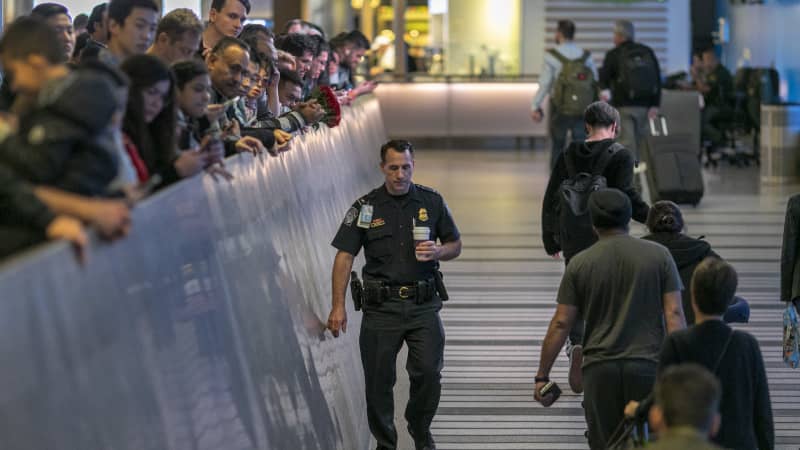(CNN) — Much is still unknown about the Wuhan coronavirus outbreak, and health officials are urging vigilance.
That means travelers crisscrossing the globe should be aware of the virus, steer clear of heavily impacted areas and exercise some of the same kinds of preventive measures they’d use to avoid influenza and other illnesses.
Here’s what travelers should know about the virus outbreak:
US escalates precautions to stem spread of virus
The Trump administration on Friday announced that it will deny entry to foreign nationals who have traveled in China in the last 14 days, unless they are immediate family of an American citizen or permanent resident.
The temporary ban will go into effect at 5 p.m. ET on Sunday, February 2.
US Health and Human Services Secretary Alex Azar also said that any US citizen who has been in China’s Hubei Province in the last 14 days will be subject to up to 14 days of mandatory quarantine upon return to the United States.
US citizens returning from the rest of mainland China who have been there in the last 14 days will undergo screening at US ports of entry and up to 14 days of self-monitoring.
Advisories discourage travel to China
The World Health Organization has declared the novel coronavirus outbreak a public health emergency of international concern, after an emergency committee reconvened Thursday in Geneva.
A number of foreign governments, including the United States, the United Kingdom, France and South Korea have evacuated citizens from Wuhan.

The CDC is warning against all nonessential travel to China.
Stringer/Getty Images
Airlines are suspending flights to China
Airlines all over the globe are canceling flights to China.
Delta Air Lines announced Friday that it will suspend all flights between the US and China from February 6 through April 30 due to ongoing coronavirus concerns.
The last China-bound Delta flight departing the US will leave on February 3 with the last return flight back to the US departing China on February 5.
American Airlines also suspended flights between the US and China, effective January 31 through March 28. United Airlines is suspending flights from the US to Beijing, Chengdu and Shanghai beginning February 6.
British Airways suspended direct flights between Britain and China on Wednesday.
Other airlines, including Lufthansa, Air France, Air Asia, EgyptAir, Cathay Pacific, Air India and Finnair have similarly slashed or suspended service.
Many airlines have offered waivers on change fees or the option to cancel for credit on a future flight.
Travelers with upcoming plans should check with their airlines and look for advisories posted on carriers’ websites.
Most travel insurance is unlikely to cover this situation
“For those who purchased a Cancel for Any Reason (CFAR) optional upgrade, however, some measure of trip cancellation protection may be available,” according to Stan Sandberg, co-founder of TravelInsurance.com.
“For those holding an existing travel insurance policy, they should contact their travel insurance providers to find out if their plans have any coverage,” Sandberg advises.
Advice for travelers who cannot avoid travel to China
The CDC advises washing hands often with soap and water for at least 20 seconds. An alcohol-based hand sanitizer can be used when soap and water are not available.
Discuss travel to China with your healthcare providers, the CDC advises, noting that older adults and travelers with underlying health issues may be at higher risk.
Travelers who’ve visited China within the past two weeks and are feeling sick with fever, have a cough or difficulty breathing should seek treatment right away and call ahead to tell medical providers about recent travel to China and symptoms.
The CDC also advises potentially infected travelers to avoid contact with others, to not travel while sick and to be sure to cover your mouth and nose with a tissue or your sleeve (not your hands) when coughing or sneezing.
Universal precautions to avoid illness apply to all travelers
Some of the above precautions apply to all travelers, particularly during winter respiratory illness season.
Influenza is a bigger threat to global public health than coronavirus right now, says Dr. William Schaffner, a professor of medicine in Vanderbilt University’s division of infectious diseases.
By the time flu season is over, influenza “will have caused literally thousands of hospitalizations and unfortunately several thousand deaths.”
“The coronavirus will be a blip on the horizon in comparison, but we have a little outbreak of corona anxiety at the present time because it’s new, it’s mysterious … ”
In the United States alone, the CDC estimates more than 8,000 deaths so far this flu season.
Wuhan coronavirus is not a big concern for US travelers traveling domestically, Schaffner says.
In this era of global travel, you can never say the risk is zero of being exposed to something, says Dr. Yoko Furuya, associate professor of medicine in the division of infectious diseases at Columbia University Irving Medical Center.
But most of the cases so far have involved Wuhan and surrounding cities in Hubei Province.
“While the risk is not going to be zero, generally speaking there’s not going to be a particularly elevated risk” outside that area, she says.

Some US airports have implemented health screenings for travelers arriving from affected areas of China.
David McNew/Getty Images North America/Getty Images
Hand washing is a strong defense; masks are less effective
Schaffner has received a lot of questions about whether people should be wearing masks to avoid infection.
He realizes it’s culturally very common in Asia, but he says the CDC doesn’t recommend it for the general public because “the scientific basis showing that people in the community wearing masks actually has any benefit is very thin and questionable.”
More fitted respirator masks may be used in medical settings, but are generally impractical for the general public, Schaffner says.
“Good hand hygiene is always a really good idea to protect yourself from any viruses and other pathogens in your environment,” says Furuya.
Air travel is part of how viruses spread
For parts of the world outside of the heavily affected region, air travel is likely where more of the risk will lie, says Furuya, because of the increased likelihood of encountering international travelers from areas with high incidence of the virus.
“When it comes to the global spread of outbreaks, air travel is usually how things kind of spread quickly from country to country,” she says.
Schaffner says the spread of winter respiratory illnesses on airplanes is always a concern. “More than once, I’m quite certain personally that I have acquired a winter virus on the aircraft while traveling or working my way through crowded airports,” he says.
Frequent and vigorous hand washing is again critical to reducing viral transmissions.
CNN’s Betsy Klein, Jen Christensen, Michael Nedelman, Sherisse Pham and Hanna Ziady contributed to this story.
